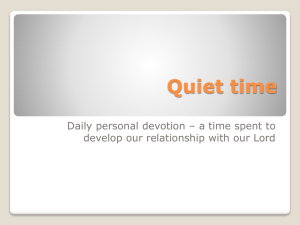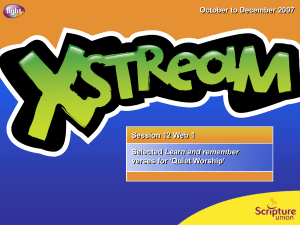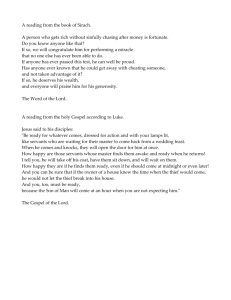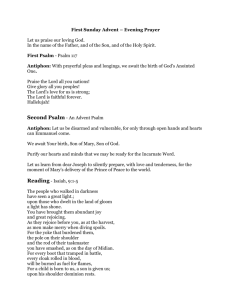Document 11078634
advertisement
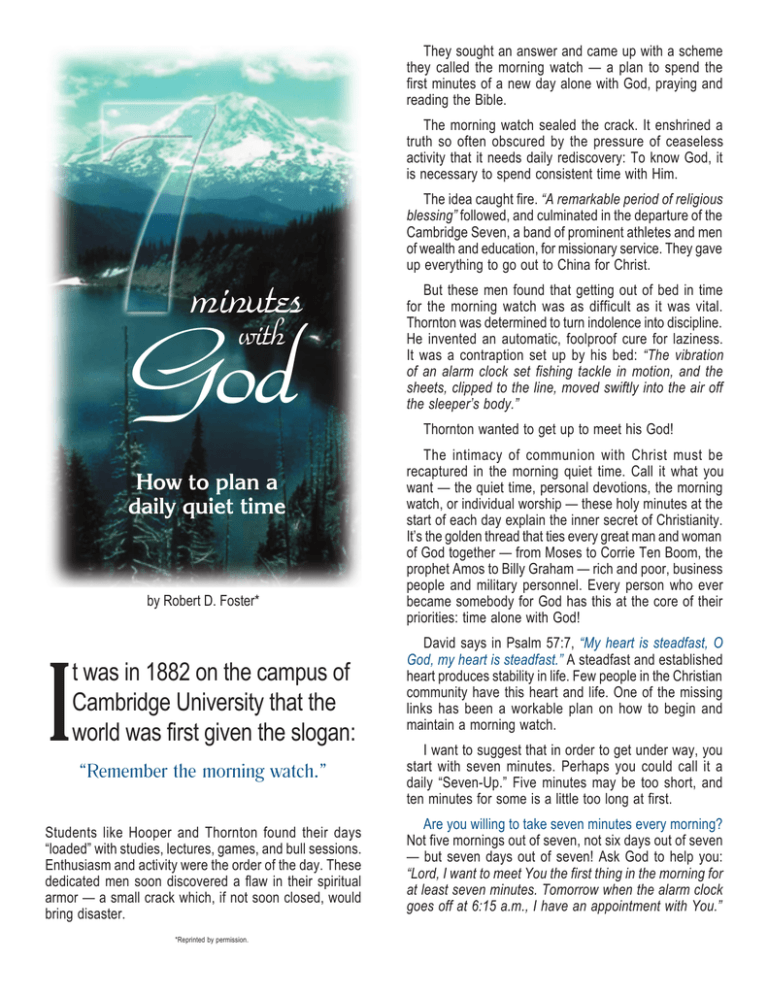
They sought an answer and came up with a scheme they called the morning watch — a plan to spend the first minutes of a new day alone with God, praying and reading the Bible. The morning watch sealed the crack. It enshrined a truth so often obscured by the pressure of ceaseless activity that it needs daily rediscovery: To know God, it is necessary to spend consistent time with Him. minutes God with How to plan a daily quiet time by Robert D. Foster* I t was in 1882 on the campus of Cambridge University that the world was first given the slogan: “Remember the morning watch.” Students like Hooper and Thornton found their days “loaded” with studies, lectures, games, and bull sessions. Enthusiasm and activity were the order of the day. These dedicated men soon discovered a flaw in their spiritual armor — a small crack which, if not soon closed, would bring disaster. *Reprinted by permission. The idea caught fire. “A remarkable period of religious blessing” followed, and culminated in the departure of the Cambridge Seven, a band of prominent athletes and men of wealth and education, for missionary service. They gave up everything to go out to China for Christ. But these men found that getting out of bed in time for the morning watch was as difficult as it was vital. Thornton was determined to turn indolence into discipline. He invented an automatic, foolproof cure for laziness. It was a contraption set up by his bed: “The vibration of an alarm clock set fishing tackle in motion, and the sheets, clipped to the line, moved swiftly into the air off the sleeper’s body.” Thornton wanted to get up to meet his God! The intimacy of communion with Christ must be recaptured in the morning quiet time. Call it what you want — the quiet time, personal devotions, the morning watch, or individual worship — these holy minutes at the start of each day explain the inner secret of Christianity. It’s the golden thread that ties every great man and woman of God together — from Moses to Corrie Ten Boom, the prophet Amos to Billy Graham — rich and poor, business people and military personnel. Every person who ever became somebody for God has this at the core of their priorities: time alone with God! David says in Psalm 57:7, “My heart is steadfast, O God, my heart is steadfast.” A steadfast and established heart produces stability in life. Few people in the Christian community have this heart and life. One of the missing links has been a workable plan on how to begin and maintain a morning watch. I want to suggest that in order to get under way, you start with seven minutes. Perhaps you could call it a daily “Seven-Up.” Five minutes may be too short, and ten minutes for some is a little too long at first. Are you willing to take seven minutes every morning? Not five mornings out of seven, not six days out of seven — but seven days out of seven! Ask God to help you: “Lord, I want to meet You the first thing in the morning for at least seven minutes. Tomorrow when the alarm clock goes off at 6:15 a.m., I have an appointment with You.” Your prayer might be, “Morning by morning, O Lord, You hear my voice; morning by morning I lay my requests before You and wait in expectation” (Psalm 5:3). How do you spend these seven minutes? After getting out of bed and taking care of your personal needs, you will want to find a quiet place and there with your Bible enjoy the solitude of seven minutes with God. Invest the first thirty seconds preparing your heart. Thank Him for the good night of sleep and the opportunities of this new day. “Lord, cleanse my heart so You can speak to me through the Scriptures. Open my heart. Fill my heart. Make my mind alert, my soul active, and my heart responsive. Lord, surround me with Your presence during this time. Amen.” Now take four minutes to read the Bible. Your greatest need is to hear some word from God. Allow the Word to strike fire in your heart. Meet the Author! One of the Gospels is a good place to begin reading. Start with the Book of Mark. Read con sec u tive ly — verse after verse, chapter after chap ter. Don’t race, but avoid stop ping to do a Bible study on some word, thought, or theo log i cal prob lem which pre sents itself. Read for the pure joy of reading and al low ing God to speak — perhaps just twenty verses, or maybe a complete chapter. When you have finished Mark, start the Gospel of John. Soon you’ll want to go ahead and read the entire New Testament. After God has spoken through his Book, then speak to him — in prayer. You now have two and a half minutes left for fellowship with him in four areas of prayer that you can remember by the word ACTS. A—Adoration. This is the purest kind of prayer because it’s all for God—there’s nothing in it for you. You don’t barge into the presence of royalty. You begin with the proper salutation. So worship Him. Tell the Lord that you love Him. Reflect on His greatness, His power, His majesty, and sovereignty! C—Confession follows. Having seen Him you now want to be sure every sin is cleansed and forsaken. Confession comes from a root word meaning “to agree together with.” Apply this to prayer. It means to agree with God. Something happened yesterday you called a slight exaggeration — God calls it a lie! You call it strong language — God calls it swearing. You call it telling the truth about somebody in the church — God calls it gossip. “If I regard iniquity in my heart, the Lord will not hear me” (Psalm 66:18). T—Thanksgiving. Express your grat i tude to God. Think of several specific things to thank Him for: your family, your business, your church and ministry responsibilities—even thank Him for hardships. “In everything give thanks: for this is the will of God in Christ Jesus concerning you” (I Thessalonians 5:18). S—Supplication. This means to “ask for, earnestly and humbly.” This is the part of your prayer life where you make your petitions known to Him. Ask for others, then for yourself. Why not include other people around the world, such as missionaries, students studying abroad, friends in distant places, and above all the people of many lands who have yet to hear about Jesus Christ. Let’s put these seven minutes together: :30 Prayer for guidance (Psalm 143:8) 4:00 Reading the Bible (Psalm 119:18) 2:30 Prayer ~ Adoration (I Chronicles 29:11) ~ Confession (I John 1:9) ~ Thanksgiving (Ephesians 5:20) ~ Supplication (Matthew 7:7) 7:00 Minutes This is simply a guide. Very soon you will discover that it is impossible to spend only seven minutes with the Lord. An amazing thing happens — seven minutes become twenty, and it’s not long before you’re spending thirty precious minutes with Him. Do not become devoted to the habit, but to the Savior. Do it not because other people are doing it — not as a spiritless duty every morning, nor merely as an end in itself, but because God has granted the priceless privilege of fellowship with Himself. Covenant with Him now to guard, nourish, and maintain your morning watch of seven minutes. A donor supported ministry of Faith Studies International FaithSearch 105 Peavey Rd., STE 200 Chaska, MN 55318 Phone: (952) 401-4501 1-800-964-1447 www.faithsearch.org For an excellent guide on developing your relationship with God, we recommend Growing Faith. To order your copy, or to receive more information, please call us, send an E-mail to info@faithsearch.org, or check our Web site.
